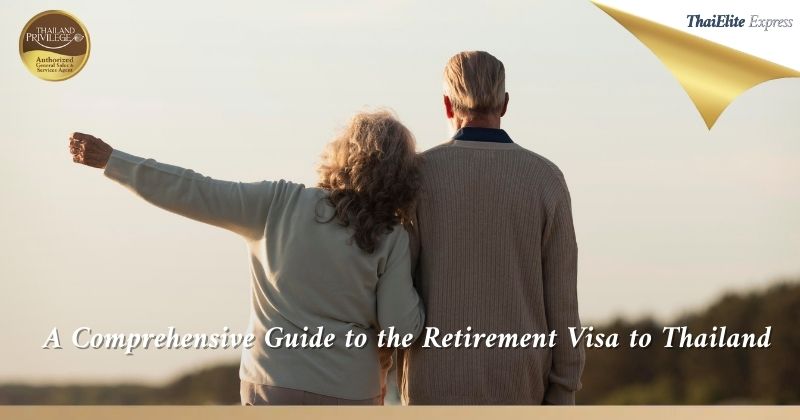
A Retirement Visa in Thailand allows individuals over 50 to legally reside in the country for the long term without frequent visa renewals or border runs. With the Thailand Privilege Card Visa, retirees can enjoy an extended stay without the hassle of constant paperwork.
Retiring in Thailand offers numerous benefits, including a warm, tropical climate year-round, affordable yet luxurious living, and world-class healthcare at a fraction of Western costs. The country also boasts a rich cultural heritage blended with modern conveniences. With its vibrant expat community, Thailand provides an idyllic and fulfilling lifestyle for retirees seeking adventure and relaxation.
For those looking for a long-term retirement visa in Thailand, there are two main options. The Thailand Retirement Visa (Non-Immigrant O-A or O-X) requires annual renewal with financial proof. Alternatively, the Thailand Privilege Card Visa offers a premium alternative, allowing long-term residency without the need for frequent renewals. Both options enable retirees to legally reside in Thailand while enjoying the country’s many benefits.
Applicants must meet specific criteria to qualify for a Retirement Visa in Thailand. They must be at least 50 years old and possess a valid passport from an eligible country such as the USA, Canada, the UK, or EU nations. Financial requirements can be met by depositing 3 million THB (USD 87,000) in a Thai bank for at least a year or receiving a monthly pension of 65,000 THB (USD 1,900) while providing proof of health insurance. Additionally, applicants must provide a rental or lease agreement confirming their residence in Thailand, hold a health insurance policy with coverage of at least USD 100,000, and, in some cases, submit a police clearance certificate from their home country.
Before applying for a Thailand retirement visa, applicants must first obtain a Non-Immigrant Visa Category “O” from a Thai embassy or consulate. This visa is valid for 90 days and allows entry into Thailand for retirement purposes. Once in Thailand, retirees can extend their stay by applying for a one-year retirement visa at the Immigration Bureau. The application process requires a valid passport, visa copies, a TM30 receipt (proof of residence reporting), financial proof, a Thai bank passbook, a verification letter, and a proof of residence document such as a rental agreement.
To ensure the Thailand retirement visa remains valid when leaving the country, retirees should obtain a Re-Entry Permit. A single-entry permit costs 1,000 THB, while a multiple-entry permit costs 3,800 THB. Additionally, retirees must report to Thai Immigration every 90 days, which can be done online, by mail, or in person.
If a retiree’s spouse does not meet the Thailand retirement visa criteria, they can apply for a Thai Dependent Visa. This requires providing a valid marriage certificate and proof of financial support. This visa must be renewed annually.
Retirees holding a Thailand retirement visa must fulfill several obligations, including 90-day reporting to Thai Immigration, obtaining a re-entry permit before traveling outside the country, and providing updated financial documents for annual visa renewal. Additionally, retirement visa holders are not permitted to work in Thailand.
While costs may vary, the typical fees for a Thailand retirement visa include a 1,000 THB (~ USD 30) visa application fee, a re-entry permit fee ranging from 1,000 to 3,800 THB, and health insurance costs that depend on the level of coverage. Some Thai banks may also charge maintenance fees for foreign accounts.
Planning to retire in Thailand requires several steps. First, it’s essential to research the cost of living, healthcare, and visa requirements. Financial planning is crucial to ensure that all visa criteria are met. Retirees should then secure housing by renting or purchasing a home in Thailand before gathering the necessary documents for a visa application at a Thai embassy. Once everything is in place, relocating to Thailand allows retirees to enjoy their new lifestyle with peace of mind.
The Thailand Retirement Visa is valid for one year, with annual renewals required. For those seeking a more permanent solution, the Thailand Privilege Card offers residency for up to 10 years, providing a hassle-free alternative to yearly renewals.
Thailand remains one of the top destinations for retirees worldwide. Whether seeking affordable living, world-class healthcare, or a tropical paradise, retiring in Thailand is a dream come true. If you’re ready to apply for a Thailand Retirement Visa, start the process today with Thaielite-Express and enjoy a worry-free retirement in the Land of Smiles.
Disclaimer: The content on this website is provided for general informational purposes and should not be interpreted as legal, financial, or professional advice. While we make every effort to ensure the information is accurate and current, some details may be subject to change or may not be fully up to date. We do not accept liability for any actions taken based on the information presented.

This guide explains the step-by-step process, typical timeline, fees, and the most common reasons LTR applications get delayed or rejected.
詳しくはこちらThailand provides multiple pathways for foreigners to live in Thailand long-term. Your best option depends on your age, financial situation,...
詳しくはこちらWhen considering a Thailand Privilege Visa, choosing the right membership level can significantly impact your experience and the benefits you...
詳しくはこちら
